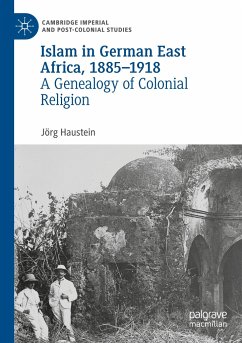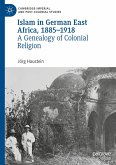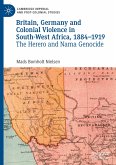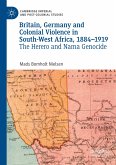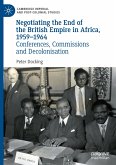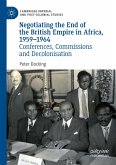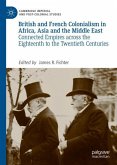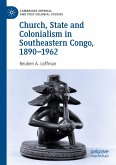- Broschiertes Buch
- Merkliste
- Auf die Merkliste
- Bewerten Bewerten
- Teilen
- Produkt teilen
- Produkterinnerung
- Produkterinnerung
In this rich and multi-layered deconstruction of German colonial engagement with Islam, Jörg Haustein shows how imperial agents in Germany's largest colony wielded the knowledge category of Islam in a broad set of debates, ranging from race, language, and education to slavery, law, conflict, and war. These representations of 'Mohammedanism', often invoked for particular political ends, amounted to a serious misreading of Muslims in East Africa, with significant long-term effects. As the first in-depth account of the politics of Islam in German East Africa, the book makes an essential…mehr
Andere Kunden interessierten sich auch für
![Islam in German East Africa, 1885-1918 Islam in German East Africa, 1885-1918]() Jörg HausteinIslam in German East Africa, 1885-191897,99 €
Jörg HausteinIslam in German East Africa, 1885-191897,99 €![Britain, Germany and Colonial Violence in South-West Africa, 1884-1919 Britain, Germany and Colonial Violence in South-West Africa, 1884-1919]() Mads Bomholt NielsenBritain, Germany and Colonial Violence in South-West Africa, 1884-191997,99 €
Mads Bomholt NielsenBritain, Germany and Colonial Violence in South-West Africa, 1884-191997,99 €![Britain, Germany and Colonial Violence in South-West Africa, 1884-1919 Britain, Germany and Colonial Violence in South-West Africa, 1884-1919]() Mads Bomholt NielsenBritain, Germany and Colonial Violence in South-West Africa, 1884-191997,99 €
Mads Bomholt NielsenBritain, Germany and Colonial Violence in South-West Africa, 1884-191997,99 €![Negotiating the End of the British Empire in Africa, 1959-1964 Negotiating the End of the British Empire in Africa, 1959-1964]() Peter DockingNegotiating the End of the British Empire in Africa, 1959-196497,99 €
Peter DockingNegotiating the End of the British Empire in Africa, 1959-196497,99 €![Negotiating the End of the British Empire in Africa, 1959-1964 Negotiating the End of the British Empire in Africa, 1959-1964]() Peter DockingNegotiating the End of the British Empire in Africa, 1959-196497,99 €
Peter DockingNegotiating the End of the British Empire in Africa, 1959-196497,99 €![British and French Colonialism in Africa, Asia and the Middle East British and French Colonialism in Africa, Asia and the Middle East]() British and French Colonialism in Africa, Asia and the Middle East104,99 €
British and French Colonialism in Africa, Asia and the Middle East104,99 €![Church, State and Colonialism in Southeastern Congo, 1890¿1962 Church, State and Colonialism in Southeastern Congo, 1890¿1962]() Reuben A. LoffmanChurch, State and Colonialism in Southeastern Congo, 1890¿196267,99 €
Reuben A. LoffmanChurch, State and Colonialism in Southeastern Congo, 1890¿196267,99 €-
-
-
In this rich and multi-layered deconstruction of German colonial engagement with Islam, Jörg Haustein shows how imperial agents in Germany's largest colony wielded the knowledge category of Islam in a broad set of debates, ranging from race, language, and education to slavery, law, conflict, and war. These representations of 'Mohammedanism', often invoked for particular political ends, amounted to a serious misreading of Muslims in East Africa, with significant long-term effects. As the first in-depth account of the politics of Islam in German East Africa, the book makes an essential contribution to the history of religion in Tanzania before British rule. It also offers a template for re-reading the colonial archive in a manner that recovers Muslim agency beyond a European paradigm of religion.
Produktdetails
- Produktdetails
- Cambridge Imperial and Post-Colonial Studies
- Verlag: Palgrave Macmillan / Springer International Publishing / Springer, Berlin
- Artikelnr. des Verlages: 978-3-031-27425-1
- 2023
- Seitenzahl: 452
- Erscheinungstermin: 15. Juli 2024
- Englisch
- Abmessung: 210mm x 148mm x 25mm
- Gewicht: 581g
- ISBN-13: 9783031274251
- ISBN-10: 3031274253
- Artikelnr.: 71261413
- Herstellerkennzeichnung Die Herstellerinformationen sind derzeit nicht verfügbar.
- Cambridge Imperial and Post-Colonial Studies
- Verlag: Palgrave Macmillan / Springer International Publishing / Springer, Berlin
- Artikelnr. des Verlages: 978-3-031-27425-1
- 2023
- Seitenzahl: 452
- Erscheinungstermin: 15. Juli 2024
- Englisch
- Abmessung: 210mm x 148mm x 25mm
- Gewicht: 581g
- ISBN-13: 9783031274251
- ISBN-10: 3031274253
- Artikelnr.: 71261413
- Herstellerkennzeichnung Die Herstellerinformationen sind derzeit nicht verfügbar.
Jörg Haustein is Associate Professor of World Christianity at the University of Cambridge and a Fellow of Selwyn College, Cambridge. Previously, he has taught at the School of Oriental and African Studies in London and the University of Heidelberg in Germany. He is a scholar of religion in Africa from the nineteenth century onward, specializing in Pentecostal Christianity, colonial Islam, and the intersection of religion and development.
1. Introduction: Studying Islam in German East Africa.- 1.1 Previous Scholarship and Sources.- 1.2 Historical Overview and Chapter Plan.- I. Race and Religion: Islam and the 'Arab Revolt'.- 2. Supplanting "Arabdom": Race and Religion in the German Conquest.- 2.1 Islam and "Arabdom" in the Scramble for East Africa.- 2.2 The "Arab Revolt" in Imperial Reckoning.- 2.3 Insurgent Coalitions and "Arab" Identity.- 2.4 Islam and "Arab" Politics.- 3. Contested Philology: Kiswahili as Religious Language.- 3.1 Missionary Philology, Religion, and Romanisation.- 3.2 Kiswahili as Contested Language.- 3.3 The Christianisation of Kiswahil.- 3.4 Race and Language: Colonial Religion and the Disavowal of Hybridity.- II. Colonial Instrumentality: Islam in the German "Civilising Mission".- 4. Slavery and Religion: From Anti-Islamic Abolitionism to Christian Serfdom.- 4.1 The Quick Rise and Fall of the German Anti-Slavery Movement.- 4.2 Islam and Christianity in the "Civilising" Regime.- 4.3 Slavery in Missionary Campaigns and Parliamentary Debates.- 4.4 Bureaucratised Manumission and Coercive Labour Regimes.- 5. Educating for Islam? The German Government Schools and "Christian Civilising".- 5.1 A School for Muslims in Tanga.- .2 "Secular" Schools and Missionary Complaints.- 5.3 Repression and Simple Equivalences.- 5.4 Colonial Instrumentality: Islam, Made in the Image of "Civilising".- III. Coloured Justice: Colonial Jurisdiction and Islamic Law.- 6. Islam in the German Legal Order: Constitutional Conflicts and "Native Law".- 6.1 The Schutzgebietsgesetz of 1886.- .2 Implementing a Racial Divide.- 6.3 Defining Religious Exemptions.- 6.4 Islam in the Colonial Practice of "Native Law".- 7. Studying Islamic Law: Elisions of German Scholarship.- 7.1 German Orientalism and Islamic Jurisprudence.- 7.2 "Native Law" and Islamic "Influence".- 7.3 Coloured Justice: The Irreality of Colonial Law.- IV. Political Islam: The Making of "Islamic Danger".- 8. Phantoms of Muslim Sedition: From Maji Maji to the "Mecca Letters".- 8.1 Islam in the Maji Maji War.- 8.2 The "Mecca Letter" of 1908.- 8.3 The Liabilities of "Islamic Danger".- 8.4 Sufi Piety and Government Interventions.- 9. Mainstreaming "Islamic Danger": Scholars, Missionaries, and Colonial Surveillance.- 9.1 German Scholars and the Geopolitics of Islam.- 9.2 Becker's Islamwissenschaft and the Colonial Congress of 1910.- 9.3 Colonial Press and Missionary Activism.- 9.4 Surveying Islam in East Africa.- 9.5 Political Islam: The Swan Song of Wartime Propaganda.- 10. Conclusion: A Genealogy of Colonial Religion.- 10.1 Pluralising Concepts: A Genealogy of Entangled Pretensions.- 10.2 Provincialising Europe: The Force of the Unrepresented.- 10.3 Rhizomatic Topography: The Sprawling Study of Islam.
1. Introduction: Studying Islam in German East Africa.- 1.1 Previous Scholarship and Sources.- 1.2 Historical Overview and Chapter Plan.- I. Race and Religion: Islam and the 'Arab Revolt'.- 2. Supplanting "Arabdom": Race and Religion in the German Conquest.- 2.1 Islam and "Arabdom" in the Scramble for East Africa.- 2.2 The "Arab Revolt" in Imperial Reckoning.- 2.3 Insurgent Coalitions and "Arab" Identity.- 2.4 Islam and "Arab" Politics.- 3. Contested Philology: Kiswahili as Religious Language.- 3.1 Missionary Philology, Religion, and Romanisation.- 3.2 Kiswahili as Contested Language.- 3.3 The Christianisation of Kiswahil.- 3.4 Race and Language: Colonial Religion and the Disavowal of Hybridity.- II. Colonial Instrumentality: Islam in the German "Civilising Mission".- 4. Slavery and Religion: From Anti-Islamic Abolitionism to Christian Serfdom.- 4.1 The Quick Rise and Fall of the German Anti-Slavery Movement.- 4.2 Islam and Christianity in the "Civilising" Regime.- 4.3 Slavery in Missionary Campaigns and Parliamentary Debates.- 4.4 Bureaucratised Manumission and Coercive Labour Regimes.- 5. Educating for Islam? The German Government Schools and "Christian Civilising".- 5.1 A School for Muslims in Tanga.- .2 "Secular" Schools and Missionary Complaints.- 5.3 Repression and Simple Equivalences.- 5.4 Colonial Instrumentality: Islam, Made in the Image of "Civilising".- III. Coloured Justice: Colonial Jurisdiction and Islamic Law.- 6. Islam in the German Legal Order: Constitutional Conflicts and "Native Law".- 6.1 The Schutzgebietsgesetz of 1886.- .2 Implementing a Racial Divide.- 6.3 Defining Religious Exemptions.- 6.4 Islam in the Colonial Practice of "Native Law".- 7. Studying Islamic Law: Elisions of German Scholarship.- 7.1 German Orientalism and Islamic Jurisprudence.- 7.2 "Native Law" and Islamic "Influence".- 7.3 Coloured Justice: The Irreality of Colonial Law.- IV. Political Islam: The Making of "Islamic Danger".- 8. Phantoms of Muslim Sedition: From Maji Maji to the "Mecca Letters".- 8.1 Islam in the Maji Maji War.- 8.2 The "Mecca Letter" of 1908.- 8.3 The Liabilities of "Islamic Danger".- 8.4 Sufi Piety and Government Interventions.- 9. Mainstreaming "Islamic Danger": Scholars, Missionaries, and Colonial Surveillance.- 9.1 German Scholars and the Geopolitics of Islam.- 9.2 Becker's Islamwissenschaft and the Colonial Congress of 1910.- 9.3 Colonial Press and Missionary Activism.- 9.4 Surveying Islam in East Africa.- 9.5 Political Islam: The Swan Song of Wartime Propaganda.- 10. Conclusion: A Genealogy of Colonial Religion.- 10.1 Pluralising Concepts: A Genealogy of Entangled Pretensions.- 10.2 Provincialising Europe: The Force of the Unrepresented.- 10.3 Rhizomatic Topography: The Sprawling Study of Islam.

